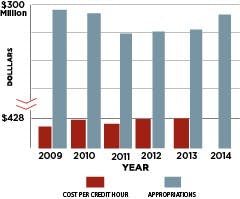LANSING — In Gov. Rick Snyder’s budget recommendation released Wednesday, state officials called for MSU to receive a 6.1 percent increase in funding for the 2015 fiscal year.
Gov. Rick Snyder and Lt. Gov. Brian Calley presented the recommendation before a joint meeting of the House and Senate appropriations committees.
This fiscal year, which ends Sept. 30, MSU received about $249.6 million from the state. MSU would stand to receive about $264.9 million in the 2015 fiscal year beginning Oct. 1 — an increase of about $15.3 million — if Snyder’s recommendation is followed.
The increase in funding is not recommended unconditionally. The report said universities will have to limit tuition increases to 3.2 percent or less in order to receiving the additional money referred to as performance funding.
After tepid reactions to the modest funding increases of the past two fiscal years, MSU President Lou Anna K. Simon viewed the current year’s recommendation hopefully.
“We are still reviewing the details of the proposal, and we agree it is imperative for the state to reinvest in higher education,” Simon said in a statement. “This is a major step in the right direction, continuing the positive trend of increasing funding after years of reducing state aid.”
The first budget recommendation of Snyder’s term in office called for deep cuts in higher education appropriations, and MSU’s funding decreased 15 percent.
The two following years, universities received increases of less than 2 percent.
Snyder said the state “had to make some tough calls,” in reference to the $1.5 billion deficit he inherited as governor, but said the proposed increases were “significant.”
The new budget recommendation could leave MSU’s state funding about $18.8 million less than when the Governor entered office. Adjusted for inflation, the difference increases to almost $27.9 million.
Snyder also announced his desire to create a $100 million competitive bond to encourage universities to increase the number of engineering graduates.
When questioned by Rep. Sam Singh, D-East Lansing, State Budget Office Director John Nixon said the state needs to continue to “strategically invest” in higher education.
“We’d like to at least get (funding levels) back to where they were before the governor took office,” Nixon said.
University funding only earned a brief mention in Snyder’s presentation, in which the Governor highlighted Michigan’s economic and fiscal rebound under his administration.
The state ended the last fiscal year with nearly $1 billion in extra revenue. A multitude of voices have weighed in on what should be done with the extra cash in the weeks leading up to the Snyder’s presentation Wednesday.
The Governor recommended utilizing the $971 million in a plethora of areas, including $250 million toward road maintenance and repairs and $17.5 million to help pay Detroit’s pension liabilities in the next fiscal year.
Snyder also recommended adding $242 million to state savings. $120 million would go into the Budget Stabilization Fund known as the rainy day fund, and $122 million into the Health Savings Fund.
Lt. Gov. Brian Calley presented the Snyder administration’s tax recommendation. Although multiple bills have emerged in the legislature calling for reductions to Michigan’s income tax, the Executive Budget Recommendation avoided discussion of the income tax and recommended an increase in the homestead property tax credit at a cost of about $200 million.JM
The credit is used to reduce the cost of property taxes for some homeowners. Calley said the tax credit increase would bring “immediate and permanent tax relief” and a third of the beneficiaries would be seniors.
The recommendation calls for the credit to be implemented retroactively and applied to 2013 fiscal year taxes.
Support student media!
Please consider donating to The State News and help fund the future of journalism.
Although he’d like to see more, Singh said he was pleased at many of the governor’s funding increases but doesn’t consider them a boon to Michigan residents.
“He’s not doing anything new,” Singh said. “What he’s doing is giving money back to people he took it from.”
Snyder said the recommendation was about “fueling Michigan’s future in a very positive and constructive way.”
But MSU professor Sanjay Gupta, an expert in corporate and individual tax policy, said if economic revitalization is the governor’s goal the money would be better spent increasing access to higher education.
“If we could, for instance, use those funds to support students who are struggling to make college because of financial constraints, this would be a great way for us to actually be able to invest rather than disinvest in higher education,” Gupta said.
Discussion
Share and discuss “Snyder asks to increase higher education funding” on social media.







